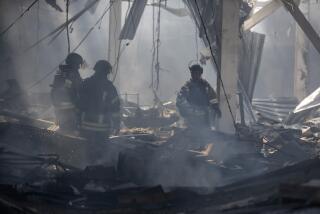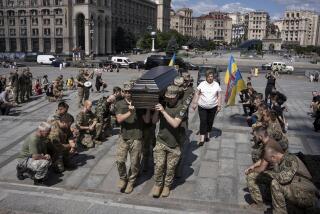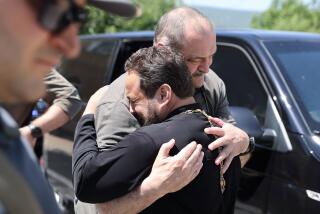A Violent Reminder That a War Lives
GROZNY, Russia — Russia has tried hard to establish an atmosphere of normality in this ruined city battered by two wars for independence. Compensation is being paid to some of those who lost their homes, oil revenue is up, and balloting to elect a new president of the Chechen republic is just three days away.
But this is Chechnya, Russia’s Iraq.
Several dozen insurgents launched an audacious nighttime raid over the weekend in the heart of Grozny, the Chechen capital -- setting up their own checkpoints, pulling police and soldiers out of their cars and executing them in the street. With dozens believed dead and at least as many injured, the myth that Chechnya’s war is over has largely come to an end for most residents.
“You go to bed, you don’t know whether you’ll wake up in the morning. Children are crying at the sound of car engines. Ask anybody, they’re afraid. Aren’t you afraid to be here?” Raisa Ausheva, a 45-year-old government trade auditor, said Thursday as she waited for a bus.
Even Russian soldiers, who were searching the city for any rebels still in hiding, seemed pessimistic about guaranteeing security for Sunday’s election.
“We have heard there are about 150 rebels who have come into the city to make an operation to disrupt the elections,” said a young Russian officer who was manning a fortified position near the scene of Saturday night’s attacks. “Is it terrifying?” He repeated the question and paused for a moment to consider his answer. “Of course,” he said.
Like the U.S. in Iraq, Russia long ago declared an end to major military operations in Chechnya, the mountainous Caucasian republic in southern Russia that has been embroiled in two separatist wars since 1994. But bolstered with recruits from Central Asia and the Middle East and funded by wealthy Arabs, the Chechen rebels have maintained their guerrilla war, persistently striking at military targets inside Chechnya, picking off one or two Russian soldiers a week.
They have also bombed hotels, trains and subways in Russia, with rebel leaders vowing to step up their attacks in an attempt to disrupt Sunday’s vote.
Investigators are looking at terrorism as one possibility after two Russian airliners crashed nearly simultaneously just before midnight Tuesday, killing all 89 people aboard. Authorities have not ruled out mechanical causes, but many Chechens said they would not be surprised to learn that the rebels were behind the disasters.
“I think it’s the vengeance of God. He’s not asleep,” said Asya Magomadova, a 44-year-old resident of Grozny.
In another echo of the U.S. war in Iraq, Russia has sought to turn over nonmilitary power in Chechnya to sympathetic Chechen police and politicians, who have become targets of the rebels because they are seen as traitors.
Sunday’s election was called because the former president, Akhmad Kadyrov -- a rebel leader who switched to the Russian side -- was assassinated in May in a bombing at a Grozny stadium. Chechen police have frequently been targeted -- as have Russian soldiers -- in roadside ambushes and checkpoint attacks.
But since the end of major military operations, there has been little to compare to the Saturday night raids, during which dozens of rebels brazenly moved into central Grozny, set up three makeshift checkpoints and shot anyone connected with the military or police.
“It was murder on Saturday,” said Zula Magomadova, 65, who lives up the street from one of the rebel checkpoints.
She said about a dozen men arrived by truck, all wearing camouflage and masks except for one man, who talked continuously on a hand-held radio. “They stopped cars. Those in the cars would show their IDs, and the ones in the masks shot them point-blank,” Magomadova said.
“When the shooting began, everybody started hiding, but I came out because I’m old. I figured nobody would shoot me. I yelled at them, ‘Boys, don’t kill anybody!’ And the masked men were waving at me, saying, ‘Go away, go away!’ This guy screamed at me, and his scream was so wild, I don’t know, he might have been drunk or something. And I had come out to him as a mother.”
Magomadova said some people appeared to be begging for their lives. “In one car there were two people, and when they stopped it, they jumped out of the car and started running. And they ran after them and shot them in the back,” she said. By the time it was over, Magomadova said, she had counted 11 bodies in the street.
The rebels arrived at 7:50 p.m. and stayed about an hour, witnesses said. The first military response vehicles didn’t come until 10.
At a market near the scene of a second rebel attack, witnesses said a woman traveling by car with a policeman was pulled from the vehicle after the officer was shot and killed.
“They took her out of the car and put her arm on the car and riddled it with bullets,” said Nina Khasanova, a shopkeeper. “They said, ‘That’s for you from the Wahhabis,’ ” the common local reference to Islamic fundamentalists.
Authorities launched a massive retaliation and series of mop-up operations Sunday night, and a number of civilians were apparently killed in the crossfire. Col. Ilya Shabalkin, spokesman for the Russian military’s anti-terrorism headquarters in the Northern Caucasus, told state-run news agency RIA Novosti that at least 50 militants were killed Sunday. Sixteen civilians were hurt, he said.
Soldiers in Grozny said 19 police and soldiers were killed in the initial attacks Saturday, but other estimates have put the number as high as 30. Shabalkin listed 12 dead in initial reports over the weekend.
“Our commander was killed. He was in a car with a civilian and [another] officer. They shot the car point-blank with a grenade launcher, and their bodies were all stuffed with shrapnel,” said a young Chechen policeman, who identified himself only as Aslan.
“Naturally it’s dangerous here,” he said. “We know what they’re capable of doing. We are organizing raids and mop-up operations. I heard that 10 bandits were caught today. But how can we know how many more there are?”
More to Read
Sign up for Essential California
The most important California stories and recommendations in your inbox every morning.
You may occasionally receive promotional content from the Los Angeles Times.










